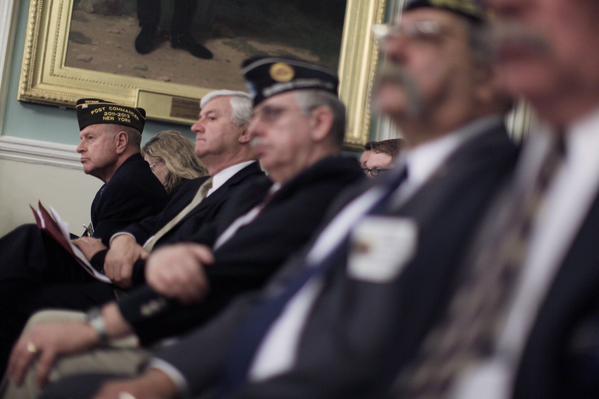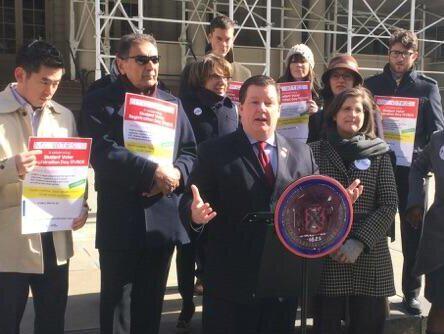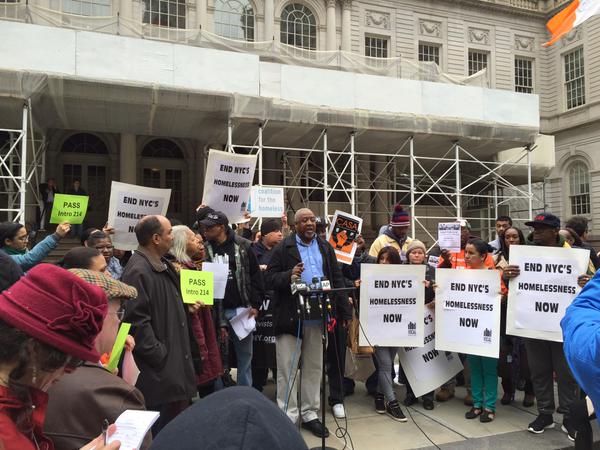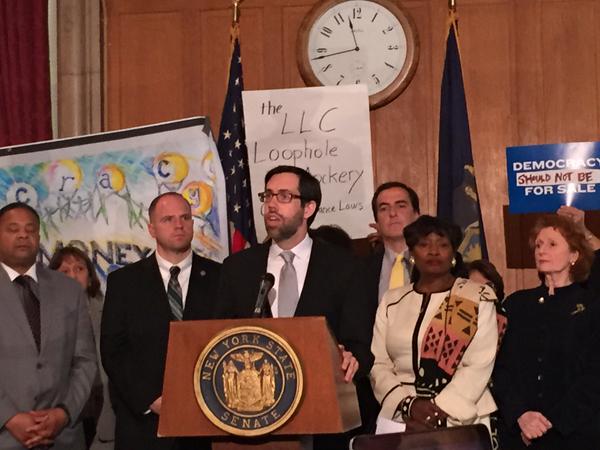
Mayor de Blasio at City Hall on Wednesday (photo: William Alatriste)
Mayor Bill de Blasio will outline his Fiscal Year 2016 Executive Budget on Thursday afternoon at City Hall. The mayor will also release his administration's first iteration of the city's 10-year capital plan. While there may still be a few surprises, we already know quite a bit about the changes the mayor has made from his preliminary budget to his executive budget.
The budget presentation will build off the mayor's $77 billion Preliminary Budget, which he unveiled in February. That spending plan was then vetted by the City Council throughout March hearings, leading to a formal response from the Council on April 14 and ongoing negotiations, heading toward a final agreement between the mayor and the Council by the end of June. City Council Executive Budget Hearings are set to begin May 18 and finish June 9. The city's fiscal year begins on July 1.
In its formal response to de Blasio, the Council pushed for, among other items: creating a citywide bail fund (ask: $1.4M); additional investments in NYCHA (ask: additional $25M); creating a year-round youth employment program (ask: $17.3M); expanding the Mayor's Office of Veteran's Affairs (ask: additonal $600,000); providing universal free lunch to city students; investing in street resurfacing (ask: additional $103M); and of course, the big button ask: hiring 1,000 additional NYPD officers (ask: $68.7M). (Note: the asks listed are for FY2016, some numbers are projected to change in subsequent years. Read full details of the Council's preliminary budget response here).
It appears the mayor is accounting for most of the items listed above and other council asks in some fashion or another, though on several fronts the details have not yet been released. Many are eagerly waiting to see where the mayor has come down on the expansion of the NYPD force.
But in the days leading up to Thursday's executive budget presentation, the de Blasio administration has previewed several elements of the new spending plan as reported by a variety of news outlets. Some of these relate to City Council asks, some do not - a rundown of what we know so far:
- Capital New York is reporting several details around savings that de Blasio will unveil: he plans "to create a first-of-its-kind $500 million account to pay for long-term capital projects" called "The Capital Stabilization Reserve"; he will set "aside $1 billion for the F.Y. 2016 "general reserve""; and it appears that "city agencies have come up with $530 million in savings through the end of F.Y. 2016" while "agencies found $125 million through F.Y. 2016 in additional revenue."
- The New York Times is reporting that de Blasio will announce new homelessness prevention spending: "the city [will] commit $100 million in annual spending, including funding for rental assistance to more than 7,000 new households, anti-eviction efforts and other measures."
- The New York Daily News is reporting that de Blasio is including additional spending on the city's most-struggling schools: "struggling and underfunded city schools will get an additional $33.6 million," with over "$20 million of the added money [going] to 94 low-performing schools already targeted for renewal by city Department of Education officials. Those schools will receive an added $250,000 per year on average, enough to hire two additional staffers or pay for hundreds of hours of extra programming for students."
- Crain's New York Business is reporting that de Blasio is set to "propose to nearly triple funding for the city's eight industrial business service providers to $1.5 million from this year's $570,000" and "include $450,000 for new industrial and manufacturing training to give workers the skills that industrial employers seek."
- The Staten Island Advance is reporting that de Blasio will announce "the city plans to boost the road resurfacing budget by $242.1 million this year."
- The Wall Street Journal is reporting that the mayor will boost "propose increasing city funding to programs run by the Department of Small Business Services by 73.5%...recommending spending $43.9 million," up from "$25.3 million for the agency in the current fiscal year. The mayor is proposing that the agency's overall budget, including funding from other sources, such as the federal government, total $167 million."
- The New York Daily News is reporting that de Blasio will announce he's devoting more money to fighting rats: "he's beefing up a successful pilot program aimed at ridding the vermin from seven neighborhoods with $3 million to make it permanent and allow it to expand citywide...over six times the $400,000 the pilot received in last year's budget."
- At Gotham Gazette, we are reporting that it is likely the city's Board of Elections will see an increase from the preliminary to the executive budget, which would follow a trend of several years and is expected by stakeholders and experts, such as the Independent Budget Office and the BOE executive director, Michael Ryan. The mayor's office has not confirmed this report though.
- TechCrunch is reporting that the de Blasio administration is "putting down a $70 million financial commitment over 10 years to make universal affordable broadband a reality — with most of that money being spent in the first two to three years." It's not immediately clear if that indicates new money being put into this year's executive budget, but the article came just before de Blasio spoke at a TechCrunch conference on Monday.
- JP Updates is reporting that de Blasio "is expected to restore funding for priority-5 child care vouchers...the FY2015 budget provided $12.6 million...According to an administration official, as part of the FY16 Executive Budget, the Mayor is permanently funding the childcare vouchers by baselining the $12.6 million a year."
- The AP is reporting that de Blasio is relieving NYCHA of money the authority is due to send the city: "New York City will waive an annual $30 million payment it is owed from the city's public housing authority...De Blasio will announce the elimination of the payment, issued every year since 1949 as a "Payment in Lieu of Taxes,"...[a] decision will save the New York City Housing Authority approximately $130 million through fiscal year 2019."
- Additionally, the AP is reporting that de Blasio is including $125 million per year over the next five years toward the MTA budget, which has become a major source of tension.
This week, the mayor and First Lady Chirlane McCray, who chairs the Mayor's Fund to Advance New York City, "announced the creation of the Center for Youth Employment, which will coordinate and expand efforts to connect New York City's young people to opportunities for career exposure, summer jobs, quality skills-building programs, supportive mentors, and thoughtful guidance towards college and a career." The Center is a public-private initiative "conceived and launched by the Mayor's Fund to Advance New York City in collaboration with City agencies and private partners, [and] will be integrated into the existing Mayor's Office of Workforce Development."
The mayor also outlined what he'd like to see from Albany in terms of housing and tenant-protection policy, as reported by the Times, and, as reported by POLITICO, the mayor will be heading to Washington, DC next week to both lobby federal lawmakers for more infrastructure and transportation funding, as well as to unveil the "Progressive Agenda" he and others have been formulating to affect the national conversation around inequality and opportunity.
***
by Ben Max, Gotham Gazette
@TweetBenMax
Note: this article has been updated














